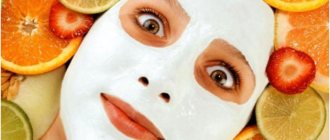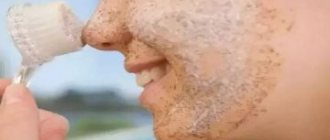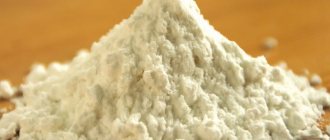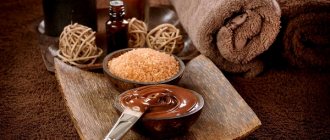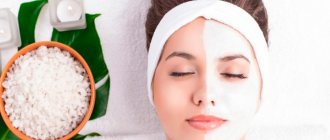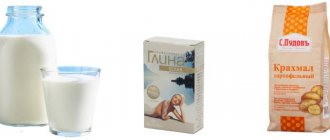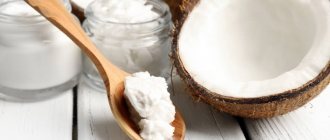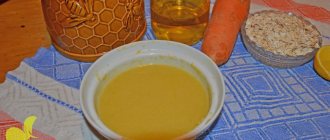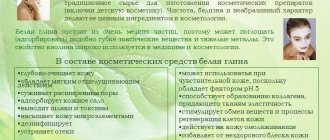An anti-inflammatory face mask, as its name suggests, is used both in the presence of inflammation on the face and for their prevention.
Most often, this type of mask is used for oily or problematic skin.
The action of masks with an anti-inflammatory effect is aimed at cleansing the skin, narrowing pores, regulating sebum secretion, eliminating infections from the surface of the skin, eliminating pimples and fighting acne.
Some anti-inflammatory face masks can be prepared at home yourself.
Rules of application
- The mask is prepared immediately before application to the skin.
- It is not recommended to store the finished mask for more than a day. Masks must be prepared from fresh ingredients. All components must be natural.
- Before applying the mask to your face, your skin should be cleansed. If your skin is oily, you can scrub it with a scrub. If the skin is normal or dry, it is enough to use a toner.
- The liquid mask is applied to the face with a brush, gauze or cotton swab. For a thicker mask, use clean hands.
- Almost all masks that have an anti-inflammatory effect can be applied to the face, neck and décolleté.
- Apply the mask along the massage lines, leaving the skin around the eyes and lips free.
- The mask should be washed off with boiled or mineral water.
- After removing the mask, you need to get your face wet.
- To achieve results, the use of masks should be regular, but you should not do it very often. Two or three times a week is enough.
When is it better to visit a cosmetologist instead of using homemade masks?
In the absence of serious health problems, the skin condition improves after 3-4 uses of the anti-inflammatory mask. If there is no positive dynamics - the pimples do not dry out or new ones appear - contact a cosmetologist. Sometimes physiotherapy is used to combat acne:
- cryotherapy;
- UV irradiation;
- darsonvalization.
An anti-inflammatory mask is a remedy for combating local manifestations of acne. To eliminate pimples and blackheads, homemade cosmetics are used every day for 1-4 weeks. After the symptoms subside, moisturizing and exfoliating masks are made 1-2 times a week. Proper facial care prevents exacerbation of acne and other problems - greasy shine, early wrinkles, blackheads, age spots.
Folk remedies
To prepare anti-inflammatory masks at home, use aloe, honey, oatmeal, cucumber and other ingredients.
- Aloe has antimicrobial and anti-inflammatory effects. Therefore, it is used in the preparation of face masks. To use aloe leaves, you need to cut off a few of the lower leaves and place them on the bottom shelf of the refrigerator for several days.
- Clay has a soothing and drying effect on the skin on pustular rashes. You can use any clay for the mask: white, green, blue, etc. Clay masks effectively relieve skin irritation and provide a whitening effect.
Causes of inflammation on the face
Usually everyone tries to get rid of rashes on the face on their own, using folk remedies and grandma’s recipes. For minor inflammation, this may work: regular disinfecting masks and antibacterial washes will reduce their amount.
However, if this is an extensive, fairly large-scale, or even more so purulent inflammation on the face, treatment should be exclusively medicinal, as prescribed by a doctor.
But first we have to find out the reasons for this misfortune.
- infectious skin lesion: harmful microorganisms (bacteria, viruses, microbes) penetrate deep into the dermis, forming foci of inflammation there, which then manifest themselves in the form of herpes on the lips or furunculosis on the face;
- allergic reactions to medications, preservatives, food, sun, cosmetics, flowering plants, insect bites, dust, metal products with nickel, pets, cleaning and detergents;
- inflammation of a thermal nature is a consequence of frostbite and burns: lovers of southern beaches and solariums often suffer from them;
- injuries and complications resulting from unsuccessful cosmetic procedures;
- damage to the skin due to an attempt to squeeze out a pimple on your own;
- hormonal changes or disorders in the body (adolescence, menopause, pregnancy, long-term use of hormonal drugs);
- weakened immunity due to frequent colds and hypothermia;
- unhealthy diet - unbalanced, insufficient;
- long-term (more than 2 months) use of potent, fairly powerful medications (hormonal drugs, antidepressants, antibiotics);
- stress, neuroses, worries, constant anxiety, depression: in this case, the body releases vasopressin and adrenaline - the first of them greatly damages the blood supply to the skin, which begins to lack nutrients and oxygen;
- diseases that cause a fever: measles or chickenpox;
- genetic predisposition: eczema, psoriasis, acne and other inflammations on the face can be a manifestation of heredity;
- bad habits: toxins that enter the body through smoking, alcoholism and drugs significantly spoil the appearance of the skin, causing numerous inflammatory reactions; Moreover, in this case, not only smokers themselves suffer, but also those who regularly inhale tobacco smoke;
- blocked sebaceous ducts: large amounts of subcutaneous oil produced by the sebaceous glands can block the pores, interfering with cellular respiration.
Once the causes of inflammation on the skin of the face become clear to you, you can do everything to eliminate them. If this is a consequence of some disease, you must first cure it. If it's all about the wrong lifestyle that you lead, you will have to give up many familiar things in order to get rid of inflammation (from fast food, for example, or smoking).
Be sure to try to determine which factor provoked the formation of foci of inflammation on your face.
The treatment prescribed by the doctor will depend on this.
Recipes for preparing anti-inflammatory face masks
- Recipes for masks with anti-inflammatory effects are varied and depend on the condition and type of skin.
- Anti-inflammatory masks are recommended for comprehensive skin care.
- Masks prepared according to folk recipes relieve irritation, inflammation and have an antibacterial effect.
To care for problem skin, yeast, quince, fruit, honey and clay masks are especially popular.
- With aloe. Aloe leaf is thoroughly ground with honey and applied to the face. After twenty minutes, the mask is washed off. The mask should be done before going to bed.
- Anti-inflammatory mask with honey. Keep 100 ml of honey in a water bath and dilute with alcohol and water, taken in equal quantities (25 ml). Apply the mixture to your face and leave for twenty minutes.
- Protein with aloe , in addition to relieving inflammation, also cleanses the skin well. One egg white and 5-6 drops of lemon juice are added to the crushed aloe leaf. The mask is applied to the face in layers, and after fifteen minutes the film should be washed off with cool water. The mask takes good care of oily skin. Adding lemon juice to the mask helps remove pigmentation.
- Egg whites are mixed with any natural fruit juice. Apply to the face for 15 minutes, then rinse off the mask with cool water.
- 10-15 grams of yeast with a tablespoon of fermented milk product (kefir, sour cream). Add some plantain juice to the mixture. Apply the mask to the skin and leave for five to ten minutes, then rinse with warm water.
- Grind plantain and nettle leaves, add a little lemon juice . The mixture is applied to the face for twenty minutes.
- Grated cucumber is applied to the skin for half an hour. Then carefully rinse off the pulp.
- Mashed grapes, cottage cheese and honey, taken in equal quantities, are mixed and applied to the face. The mixture is left for fifteen minutes. Then wash off with water without wiping your face.
- Curd and kefir mask. Grind one spoon of cottage cheese with three spoons of kefir and lubricate the face with the mixture. After twenty minutes, the mask can be washed off.
- three tablespoons of oatmeal with the same amount of milk and leave for the flakes to swell. Apply the mixture to your face for half an hour, then rinse off first with warm and then cool water.
- boiling water over chamomile (4 tbsp) until a paste forms. Apply the paste onto the face through gauze and leave for 40 minutes, then remove the mask and wash. Since the chamomile mask dries out the skin, you can apply a moisturizer to your face after it.
- a tablespoon of yeast with half a teaspoon of lemon juice, dilute with water until a thick paste forms. Apply the mask to your face and leave until completely dry. Then wash off the mask with cool water.
- Mash three tablespoons of strawberries, add two teaspoons of grapefruit juice and a teaspoon of beaten egg. Apply the mask to your face and leave it on for twenty minutes, then rinse off.
- Grate peeled raw potatoes and squeeze out the juice. Add oatmeal, rye or buckwheat flour to it until a liquid slurry forms. Keep the mask on your face for 15-20 minutes, then wash with cool water.
- chopped cucumber with egg white. The mask is applied in layers.
- Apply finely grated quince to your face. Rinse off the mixture with a solution prepared at the rate of 1 spoon of lemon juice and apple cider vinegar per 1 liter of water.
- Mix two tablespoons of green clay , olive oil and protein. Apply the mixture to your face until completely dry. Rinse with acidified water, as in the previous recipe.
- Mix clay with milk in equal quantities and apply to the skin, and after 15-20 minutes, rinse the clay with warm water.
- Nettle mask. Brew two tablespoons of green leaves with boiling water and leave for about an hour. Then apply the leaves to your face for twenty minutes. Wash with nettle decoction.
- Prepare 2 tablespoons of soaked clay and add one protein and a teaspoon of vegetable oil. Apply the mask for 20 minutes. Rinse off with cool water acidified with vinegar.
- A quince mask helps with acne. Apply the pulp of the finely grated fruit to the skin and leave for 20 minutes. Rinse off with acidified water.
- Orange and cherry acne mask. Mix the pulp of a quarter of an orange and 6-7 cherries. Add a tablespoon of starch to the mixture and apply to the face for 25 minutes. Rinse off the mixture with cool water.
- a tablespoon of calendula tincture with a tablespoon of water and wheat flour to the consistency of a thin paste. This mask dries out acne well and relieves inflammation.
- Hercules mask. Mix a tablespoon of St. John's wort infusion with the same amount of vegetable oil and ground rolled oats. You can add 10 drops of an oil solution of vitamins A and E to the mask. If they are absent, a tablespoon of carrot juice will do. The mask is indicated for dry skin.
If it is not possible to make an anti-inflammatory face mask, you can prepare tinctures, lotions, and ice cubes from herbal decoctions.
Honey-calendula face rub for acne
Mix two tablespoons of calendula tincture (you can prepare it yourself or buy it at the pharmacy) with the same amount of water and add a spoonful of honey.
Use to lubricate problem areas of the skin.
Rubbing is contraindicated in the presence of rosacea.
Pine-herbal lotion
- Mix two tablespoons of crushed pine needles, a tablespoon of dry plantain leaves, the same amount of chamomile and calendula flowers.
- Pour half a liter of vodka over the mixture of herbs.
- Infuse the mixture in a dark place for two weeks, then strain and store in the refrigerator.
Wipe pimples with lotion 2 times a day.
Healers from the front garden
Many women benefit greatly from medicinal plants. Those that we see every day, without realizing their amazing properties.
The healing potential of chamomile has long been known; it also helps with inflammatory processes on the skin of the face. Pour boiling water over a glass of dry chamomile and leave for 15 minutes. Spread the swollen mass into which the chamomile will turn evenly onto gauze and apply it to your face. Keep this mask on for about 30 minutes until it dries. Since this procedure dries the skin very much, apply a moisturizing cream afterwards.
